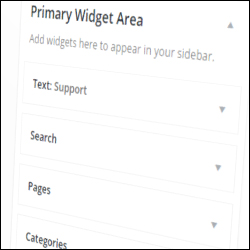 In Part 1 of this step-by-step tutorial series, we explained the basics of using WordPress widgets.
In Part 1 of this step-by-step tutorial series, we explained the basics of using WordPress widgets.
In this tutorial you are going to learn how to begin configuring a number of WordPress sidebar widgets.
How To Configure Widgets
By default, your site comes with a number of preinstalled active widgets, such as widgets that let you display links to your site’s pages, recent posts, newsfeeds, adding a search box, etc.
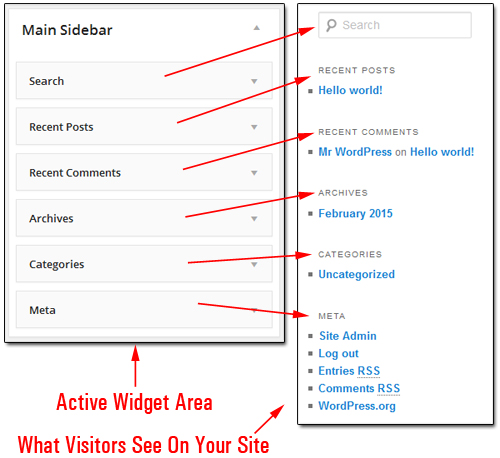
(In a default WordPress installation, your site comes with a number of pre-installed widgets)
How To Configure Sidebar Widgets: Step-By-Step Tutorial
In this step-by-step tutorial series, you will add, configure and reorder a number of commonly-used widgets to display in your site’s sidebar navigation menu, including:
- Adding a Help graphic linking visitors to your contact page.
- Adding a Categories section.
- Add a Recent Posts section to display the latest posts.
- Add a list of the site’s most important Pages.
- Display important Links on your sidebar.
- Adding an RSS Feed section.
- Adding a Tag Cloud section.
- Add and configure an Archives section to your sidebar.
The Widgets panel is located in your WordPress admin area and can be accessed by going to Appearance > Widgets …
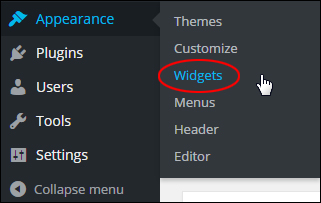
(Widgets Menu)
This brings up the Widgets screen in your browser …
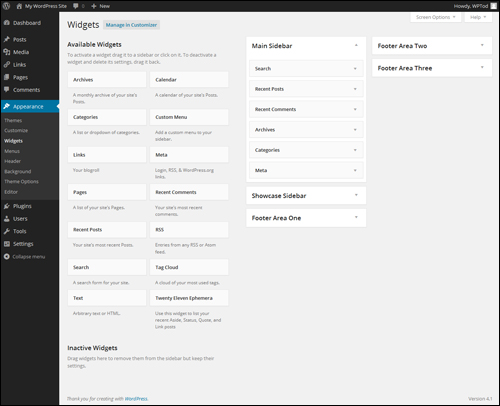
(Widgets Section)
Let’s get started …
Add A Text Widget To The Sidebar Section
Text widgets are incredibly useful …
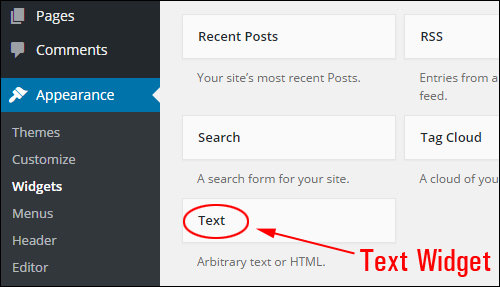
(Text widget)
![]()
Rich Text Widget
From version 4.8 onward, WordPress has added native rich-text editing capabilities to text widgets …
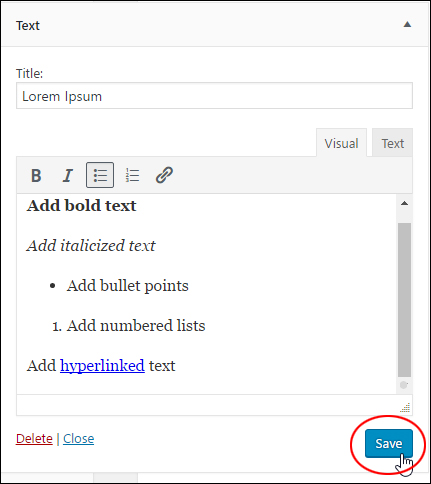
(Rich Text Widget)
This lets you quickly and easily format text, create lists, add emphasis, and insert links into your sidebar text …
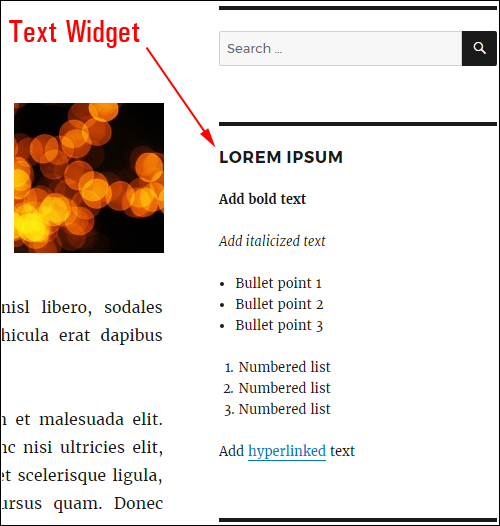
(Format text easily with the new text widget)
A text widget lets you insert just about anything you want into the sidebar navigation area or other widget sections, such as single lines or paragraphs of text, videos, reviews and more to your site … simply type in text or add HTML into the widget content area. You can also add an optional title in the Title field. Remember to save your settings …
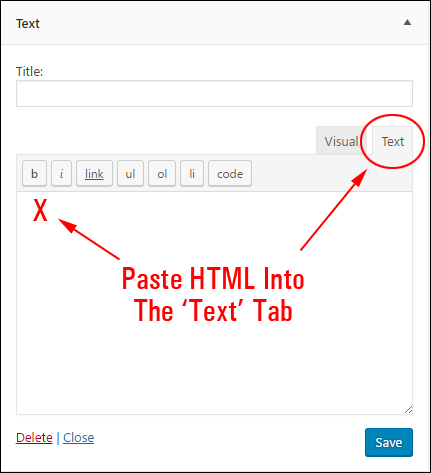
(Text widgets are very useful!)
Example: Use A Text Widget To Add A Support Button To The Sidebar Area
For this example, let’s set up a clickable help button on your sidebar that will take visitors to a page on your site (or an external site, e.g. a helpdesk) where they can contact you for help and support.
First, create or source a graphic image that your visitors can click on …
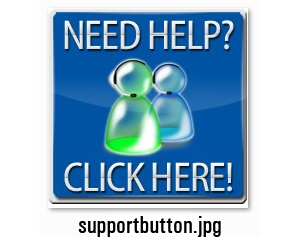
We’ll set up the clickable Help button to display at the top of the sidebar like in the example shown below …
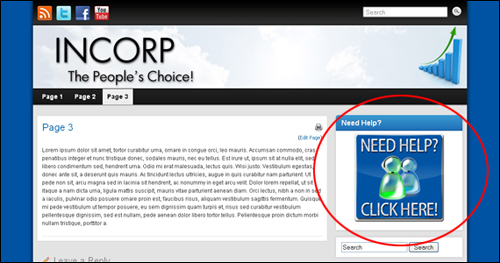
Step 1 – Upload your image.
To display an image on your site, you must first upload the button image to a folder on your server and note down the URL pointing to your server’s image location.
E.g. …
http://www.yourdomain.com/images/supportbutton.jpg
You will use this information in Step 3.
For someone to go to the contact page when they click on the help button, you must either create a contact page, or have an existing destination page already set up (e.g. a helpdesk). We will link your button graphic to this URL in Step 3 …
Step 2 – Create a support page.
Create a contact page on your site and note the page URL …

Step 3 – Create your text widget code.
If you’re not a technical-minded person, don’t worry … this sounds a lot more technical than it is. In simple terms, we just need to create the instructions linking the button image to the destination URL.
Your code can be composed in a simple text editor and will look something like this …

- Replace “http://www.yourdomain.com/contact-us” in the code above with the URL of your contact page location.
- Replace “http://yourimagelocation.com/img/supportbutton.jpg” in the code above with the URL of your image location.
The screenshot below shows which sections of the above code you need to replace with the actual contact page and image URLs …

Replace the above URLs and then copy all of the above code to your clipboard when finished.
If you need help understanding basic HTML code, see this tutorial:
Now, go back into your Widgets screen …
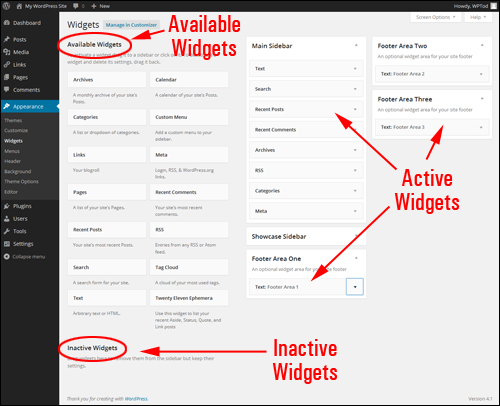
(Widgets Area)
Step 4 – Add a Text widget.
Add a Text widget to your sidebar where you would like your clickable button to display.
In the Available Widgets area, select the Text widget …
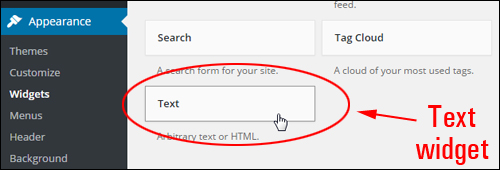
(Text widget)
Drag the Text widget to your Active Widgets section and release it at the very top of the Widget Area …
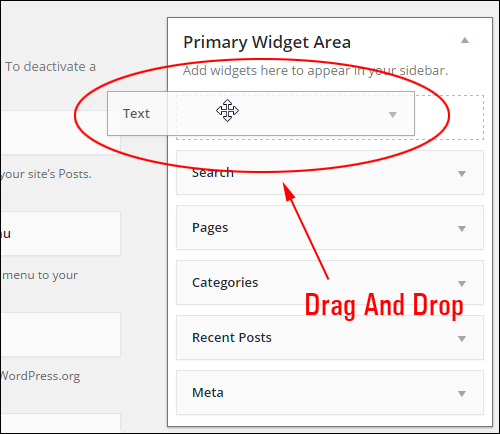
(Dragging and dropping your WordPress text widget)
Step 5 – Configure your widget settings.
Click on the widget title bar to configure the widget settings. Paste the code with the URLs to your contact page and graphic button into your text widget content area and click the save button …

Add a title section to the widget if you want (e.g. “Need Help?”, “Support”, etc.) and paste the code with the correct URLs into the Content area, then click the save button …
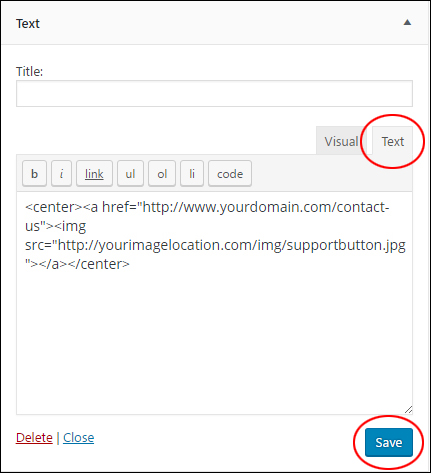
![]()
Note: Make sure to test all URLs before pasting scripts into your Text Widget, or your button won’t work.
*** If using WordPress version pre-4.8 ***
If you’re adding text without formatting tags, you may want to tick the Automatically add paragraphs box to wrap each block of text in an HTML paragraph code (note: this is not necessary if you’re typing in HTML content like we’re doing in this tutorial).
Here is some text with Automatically add paragraphs option not selected …
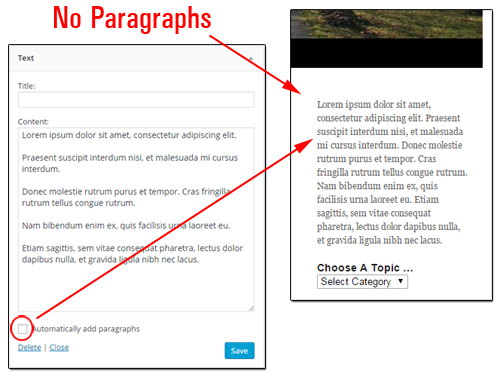
(Automatically add paragraphs option unchecked)
Here is some text added to a Text widget with Automatically add paragraphs option ticked …
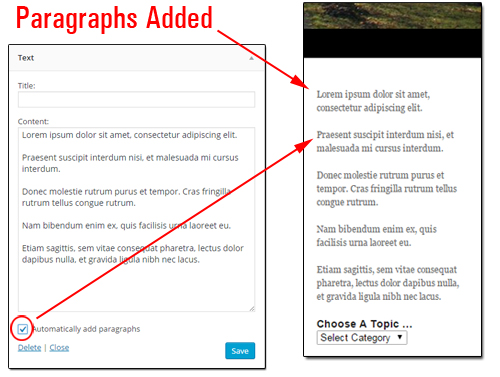
(Automatically add paragraphs box selected)
***
Step 6 – Refresh your web browser.
After adding your text widget and code, go to your site and refresh your browser. If you have entered all of the links correctly, then the support button will display in the site’s sidebar menu …
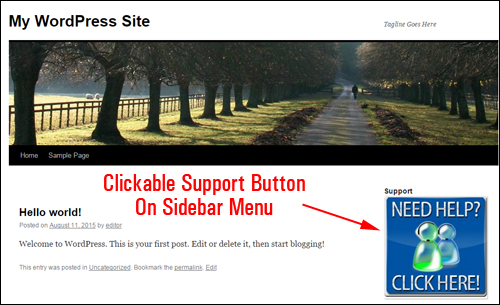
(Clickable button widget on sidebar)
The screenshot above shows ’click for help’ button added to a newly-installed WordPress site.
Step 7 – Test your widget.
The last step is to ensure that the destination URL works. Test this by clicking the help button. If you are taken directly to the support page, then the text widget has been set up correctly …
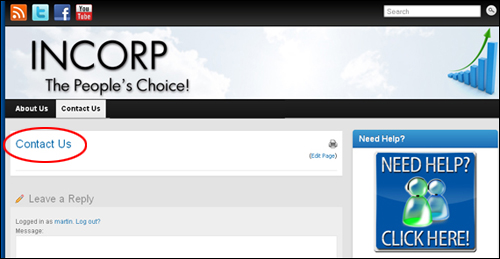
(Test your clickable button to make sure you’ve set everything up correctly)
![]()
Text Widgets – Useful Tips:
If you want your support page to open in a new window when visitors click on the help (so they don’t leave the page they’re in), then change the code from this:

To this (i.e. include the part containing target=”_blank” in your text widget code):

When choosing images for your sidebar area, make sure that the width of your image doesn’t exceed the width of the sidebar column, especially if you are using a non-responsive WordPress theme. As mentioned earlier, some themes may display elements differently depending on their templates and layout. Some sidebars may be wider or narrower. If your theme’s sidebar width is narrower than the width of the graphic images, then you may have to either adjust the graphic size, or the column width to make elements display correctly on your sidebar area.
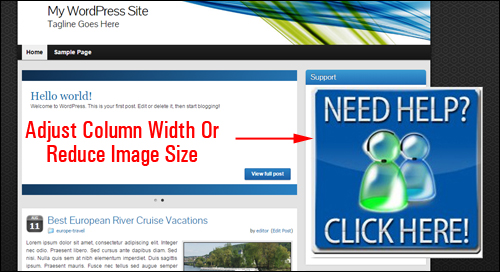
(Make sure the image width does not exceed the sidebar column width)
Additional Tips:
- If you don’t want the button image to be centered in your sidebar, delete the <center> and </center> tags from the beginning and end of the line of code. The image will then be aligned to its default settings (normally left-aligned).
- Link your help button to any URL you want (e.g. to an external site, helpdesk, support forum, etc.) and change this anytime by editing the code in the widget.
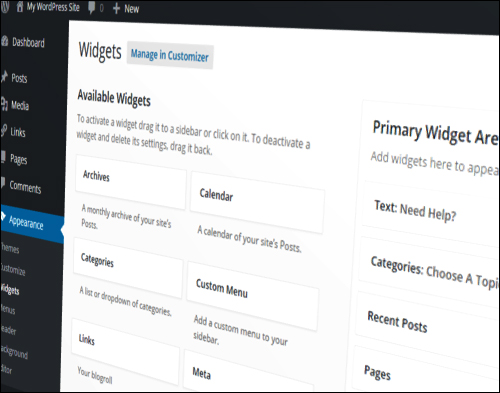
***
This is the end of part 2 of this tutorial about how to use Widgets.
Click here to keep reading:
***
"I love the way your email series "Infinite Web Content Creation Training Series" is documented and presented. It is very absorbing and captivating. The links and tutorials are interesting and educational. This has motivated me to rewrite my content following the concepts I am learning from the email series." - Mani Raju, www.fortuneinewaste.com